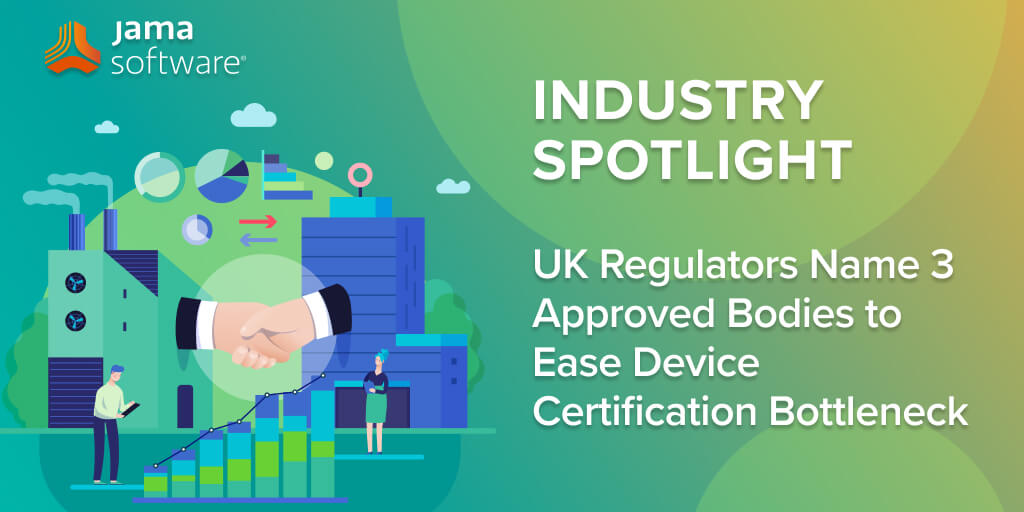
Jama Software is always looking for news that would benefit and inform our industry partners. As such, we’ve curated a series of customer and industry spotlight articles that we found insightful. In this blog post, we share excerpts from an article, sourced from MedTech Dive, titled “UK regulators name 3 approved bodies to ease device certification bottleneck” – originally written by Nick Paul Taylor and published on August 31, 2023.
UK regulators name 3 approved bodies to ease device certification bottleneck
A MHRA leader hailed the action as “almost doubling capacity for medical device assessment in the U.K.”
Dive Brief:
- The Medicines and Healthcare Products Regulatory Agency (MHRA) has designated three more bodies to certify medical devices in the U.K.
- As a result of Brexit, the U.K. is requiring manufacturers of all except the lowest-risk devices to apply for UK Conformity Assessment (UKCA) certification from an approved body. The approved bodies perform the same role as the notified bodies that issue CE marks to devices sold in the European Union.
- MHRA’s designation of three approved bodies helps address a capacity shortage that led the government to stagger the transition from CE marks to UKCA certification.
RELATED: Failure Modes, Effects, and Diagnostic Analysis (FMEDA) for Medical Devices: What You Need to Know
Dive Insight:
MHRA automatically moved the U.K.’s three existing notified bodies, BSI, SGS and UL, to the approved body scheme when the country split from the European Union. Since then, efforts to add capacity have proceeded slowly. The U.K. affiliate of DEKRA, a notified body in the EU, became the first new approved body for medical devices 11 months ago.
Now, MHRA has designated TÜV SÜD, Intertek, and TÜV Rheinland UK. The designation clears the three bodies to certify general medical devices and empowers TÜV Rheinland UK to assess in vitro diagnostic (IVD) products. IVD capacity is lagging behind, with MHRA having designated four bodies in total.
In a statement, Laura Squire, chief healthcare quality and access officer at MHRA, hailed the addition of the three approved bodies as “almost doubling capacity for medical device assessment in the U.K.” It is unclear how many applications each approved body is capable of handling.
RELATED: Elevating Your Medical Device and Life Sciences Product Development Processes with Jama Connect®
Even so, the designations go at least some way toward addressing a long-standing concern. The Regulatory Horizons Council identified the “lack of capacity in approved bodies within the U.K.” as a risk to patient safety and access to devices in a report two years ago.
Responding to the report early this year, the government accepted recommendations about addressing bottlenecks in device approval, notably the shortage of approved bodies, and taking mitigating steps to ensure the supply of products after the transition to UKCA. The concerns informed the decision to keep accepting devices with CE marks through 2028 or 2030, depending on the regulation.
- With Hacks on the Rise, Manufacturers Hone Their Cybersecurity Smarts - January 23, 2025
- Jama Connect® Stands Alone as the Leader in Requirements Management Software - January 21, 2025
- FDA Issues Comprehensive Draft Guidance for Developers of Artificial Intelligence-Enabled Medical Devices - January 15, 2025